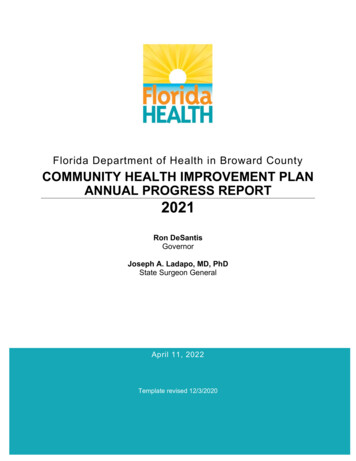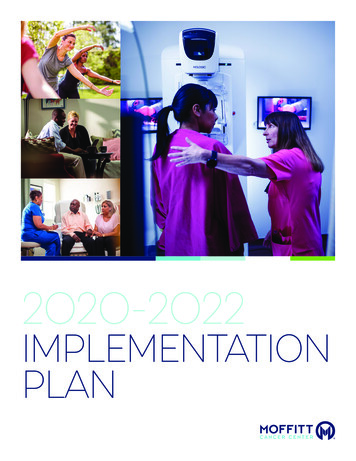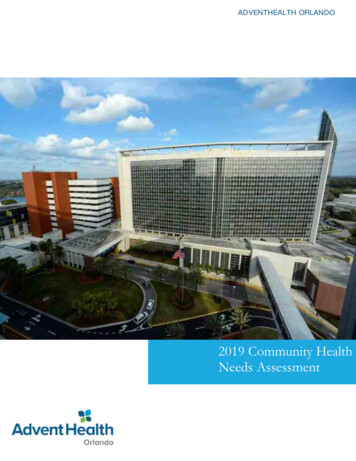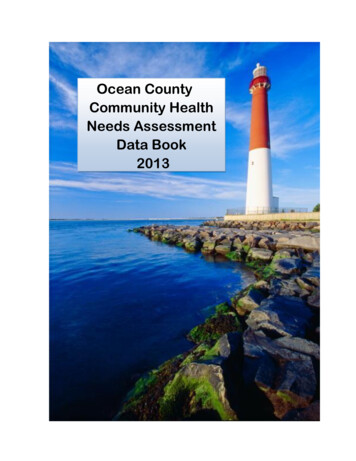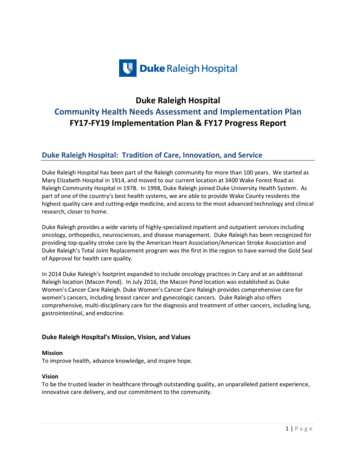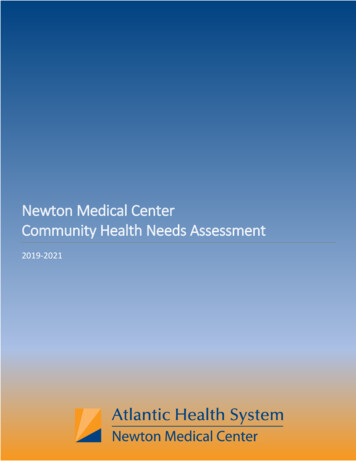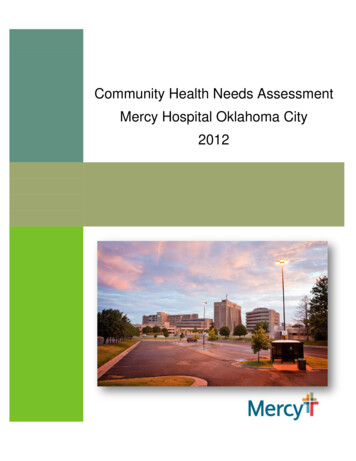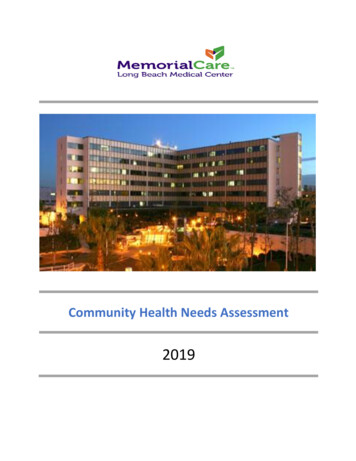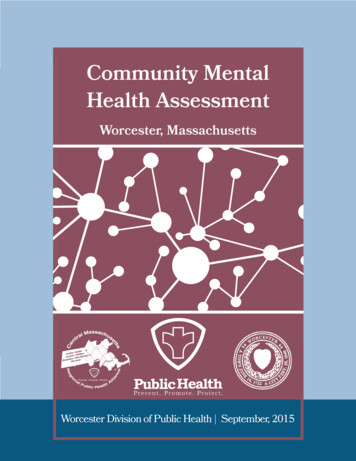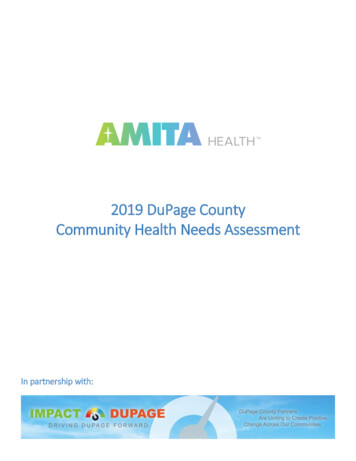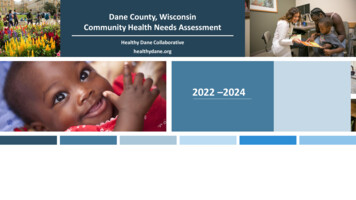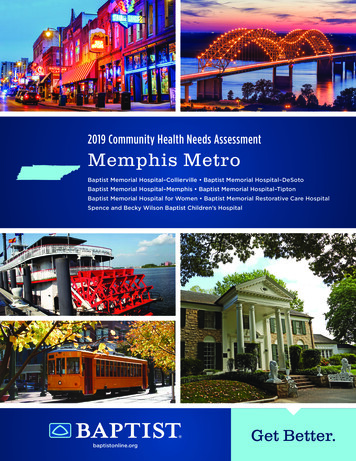
Transcription
2019 Community Health Needs AssessmentMemphis MetroBaptist Memorial Hospital–Collierville Baptist Memorial Hospital–DeSotoBaptist Memorial Hospital–Memphis Baptist Memorial Hospital–TiptonBaptist Memorial Hospital for Women Baptist Memorial Restorative Care HospitalSpence and Becky Wilson Baptist Children’s Hospitalbaptistonline.orgGet Better.
2019 CHNA ReportSeptember 2019Table of ContentsOur Commitment to Community Health2A Systemwide Approach to Community Health Improvement3Baptist’s Affiliate Hospitals and Primary Service Counties4Memphis Metro Service Area 2019 CHNA Executive Summary5CHNA Hospital Partners and Study Service Area5CHNA Leadership5CHNA Methodology6Community Engagement6Overview of the Memphis Metro Service Area6Community Health Priorities7Priority Health Needs in the Memphis Metro Service Area7Implementation Plan9Board Approval9Full Report of 2019 CHNA Memphis Metro Service Area10Baptist’s Memphis Metro Service Area11Memphis Metro Service Area Demographic Data Analysis12Statistical Analysis of Health Indicators23Key Informant Survey Findings63Focus Groups Summary73Evaluation of Impact From the 2016–2019 CHNA Implementation Plan80Priorities for 2019–2022 CHNA Implementation Plan82Board Approval83Appendix A: Public Health Secondary Data References84Appendix B: Key Informant Survey Participants86Appendix C: Federally Qualified Health Center Locations88Baptist Memorial Health Care1
2019 CHNA ReportSeptember 2019Our Commitment to Community HealthBaptist Memorial Health Care is dedicated to the health and well-being of the manycommunities we serve across the Mid-South. We believe strongly in corporate citizenship andthe importance of collaboration with local organizations to build stronger and healthiercommunities.To help us track community health and identify emerging concerns, Baptist conducts aCommunity Health Needs Assessment (CHNA) every three years. We use this comprehensivestudy to ensure our initiatives, activities and partnerships align with community needs.Some of our key initiatives are listed below.Healthy communities lead toProviding access to high-quality health carelower health care costs, robustBaptist ensures residents can receive care when they need itcommunity partnerships and anacross the region. We reinvest resources in technology to bring theoverall enhanced quality of life.highest level of health care to people across the Mid-South. Weinvest in hospitals and health services to deliver care tocommunities the federal government considers as Medically Underserved Areas or HealthProfessional Shortage Areas. We extend our care through community clinics and mobileservices to reach people who might not otherwise receive care. We subsidize services, such asemergency care, free and reduced services for the uninsured and preventive screenings thatare essential for health, but not adequately covered by federal and state funding.Developing community partnershipsWe recognize that our hospitals are vital organizations within the communities we serve and weknow that we cannot address every community need by ourselves. In order to promote healthand quality of life, we collaborate with community partners who have expertise in social needs,specialty services, faith leadership, advocacy and essential resources. We also foster ongoingrelationships with these partners and provide financial and in-kind gifts to support their work.Investing in health care education and researchBaptist supports excellence in health care training and education through programs that focuson math, science and related subjects to prepare tomorrow’s health care workforce. As we planfor the future, we provide training opportunities for emerging health care professionals andencourage students to pursue medicine, nursing and other allied health careers. Throughleading-edge research and clinical trials, we help to advance learning in the medical field anddevelop new treatments for cancer and other diseases.In these and many other ways, we demonstrate our commitment to the people we serve and ourcommunities. In undertaking and funding regular community health needs assessments, weensure our hospitals will be stronger partners in our neighborhoods and prepared to meet thefuture needs of all those who live there.Baptist Memorial Health Care2
2019 CHNA ReportSeptember 2019A Systemwide Approach to Community Health ImprovementBaptist Memorial Health Care has 22 affiliate hospitals serving residents in three states. TheCHNA focused on the primary service county of each not for profit Baptist Memorial hospital toidentify health trends and unique disparities within these communities. Hospitals withoverlapping service areas were grouped into regions for comparisons of health andsocioeconomic data. Systemwide priorities were determined to address common health needsacross the Mid-South. Specific strategies were outlined in each not for profit hospital’sImplementation Plan to guide local efforts and collaboration with community partners.2019 CHNA Geographic Regions and Primary Service AreasRegionPrimary Service CountiesShelby County, ississippiCentralMississippiHospitalsBaptist Memorial Hospital–MemphisBaptist Memorial Hospital–ColliervilleBaptist Memorial Hospital for WomenBaptist Memorial Rehabilitation Hospital*Baptist Memorial Restorative Care HospitalCrestwyn Behavioral Health*Spence and Becky Wilson BaptistChildren’s HospitalTipton County, TNBaptist Memorial Hospital–TiptonDeSoto County, MSBaptist Memorial Hospital–DeSotoCraighead & Poinsett counties, ARCrittenden County, ARNEA Baptist Memorial HospitalBaptist Memorial Hospital–CrittendenCarroll County, TNBaptist Memorial Hospital–Carroll CountyObion County, TNBaptist Memorial Hospital–Union CityLafayette & Panola counties, MSBaptist Memorial Hospital–North MississippiBenton and Union counties, MSBaptist Memorial Hospital–Union CountyPrentiss County, MSBaptist Memorial Hospital–BoonevilleLowndes County, MSBaptist Memorial Hospital–Golden TriangleCalhoun County, MSBaptist Memorial Hospital–CalhounAttala, Hinds, Leake, Madison, Rankinand Yazoo counties, MSBaptist Memorial Hospital–Mississippi Baptist Medical CenterAttala County, MSBaptist Memorial Hospital–AttalaLeake County, MSBaptist Memorial Hospital–LeakeYazoo County, MSBaptist Memorial Hospital–Yazoo*These entities are not required to conduct a CHNA.Baptist Memorial Health Care3
2019 CHNA ReportSeptember 2019Baptist’s Affiliate Hospitals and Primary Service CountiesBaptist Union CityArkansasTennesseeBaptist Carroll CountyBaptist TiptonNEA BaptistBaptist CrittendenBaptist MemphisBaptist Women’s HospitalBaptist Rehabilitation HospitalBaptist Restorative CareBaptist Children’s HospitalBaptist ColliervilleCrestwynBaptist DeSotoBaptist BoonevilleBaptist Union CountyBaptist North MississippiBaptist CalhounMississippiBaptist Golden TriangleBaptist AttalaBaptist YazooBaptist LeakeMississippi Baptist Medical CenterBaptist Memorial Health Care4
2019 CHNA ReportSeptember 2019Memphis Metro Service Area 2019 CHNAExecutive SummaryCHNA Hospital Partners and Study Service AreaBaptist Memorial Health Care has seven hospitals in the Memphis Metro Service Area, whichcollaborated on the 2019 CHNA. The study encompassed Shelby County, Tennessee; TiptonCounty, Tennessee and DeSoto County, Mississippi. The region is located in SouthwestTennessee and Northwest Mississippi, along the Arkansas border. The following hospitalsparticipated in the 2019 CHNA for the Memphis Metro Service Area. Baptist Memorial Hospital–Memphis Baptist Memorial Hospital–Collierville Baptist Memorial Hospital–DeSoto Baptist Memorial Hospital for Women Baptist Memorial Hospital–Tipton Baptist Memorial Restorative Care Hospital Spence and Becky Wilson Baptist Children’s HospitalCHNA LeadershipA Baptist Memorial Health Care steering committee, along with community representatives andpartners, oversaw the 2019 CHNA. Community health consultants assisted in all phases of theCHNA, including project management, data collection and analysis, report writing anddevelopment of Implementation Plans.Baptist 2019 CHNA Steering CommitteeDonna Baugus, Manager of Survey ResearchCynthia Bradford, System Community Involvement ManagerScott Fountain, Senior Vice President and Chief Development OfficerTom Gladney, Director of Data Management and Decision SupportBill Griffin, Executive Vice President and Chief Financial OfficerCaitlin Hayden, System Community Outreach and Special Events CoordinatorKelley Jerome, General CounselJeff Lann, Manager of Research and Marketing DevelopmentDebbie Lassiter, Health Services Research ConsultantCheryl Lee, Director of Tax and ComplianceJim Messineo, Director of Revenue and Operations AuditsBrenna Piccirilli, Cost Accounting Analyst in Decision SupportKellie Prescott, Cancer Program CoordinatorAnne Sullivan, MD, Chief Quality and Academic OfficerHenry Sullivant, MD, Vice President and Chief Medical OfficerMorgan Thornton, Finance and Health Research InternKimmie McNeil Vaulx, System Director of Corporate CommunicationsAnn Marie Watkins Wallace, System Senior Community Outreach CoordinatorConsulting TeamColleen Milligan, MBA, Director, Community and Population Health PlanningCatherine Birdsey, MPH, Research ManagerJessica Losito, BA, Research ConsultantBaptist Memorial Health Care5
2019 CHNA ReportSeptember 2019CHNA MethodologyThe 2019 CHNA for Baptist’s Memphis Metro Service Area was conducted from August 2018 toAugust 2019. Quantitative and qualitative methods, representing both primary and secondaryresearch, were used to illustrate and compare health trends and disparities across eachhospital’s service area. The following research methods were used to determine communityhealth needs. A review of public health and demographic data portraying the health and socioeconomicstatus of the community. A full listing of data references is included in Appendix A. A Key Informant Survey of 80 community representatives serving the Memphis MetroService Area to identify community health priorities, underserved populations, partnershipopportunities and other insights. A list of key informants and their respective organizations isincluded in Appendix B. Focus groups with 98 cancer survivors or caregivers to collect perspectives about theirexperiences, preferences and attitudes related to cancer diagnosis and care. Criteria-based prioritization of health issues to determine the most pressing health needsaffecting the health status of Memphis Metro residents.Community EngagementCommunity engagement was an integral part of the CHNA research. In assessing the healthneeds of the community, Baptist solicited and received input from community leaders andresidents who represent the broad interests of the community, including those with expertise inpublic health and members or representatives of medically underserved, low-income andminority populations. These individuals provided valuable information about health trends,insights about existing resources and gaps in services and perspectives about factors thatcontribute to health disparities.Overview of the Memphis Metro Service AreaThe Memphis Metro Service Area differs in some notable ways from the nation overall. DeSoto,Shelby and Tipton counties have a greater proportion of Black/African American residents thanthe nation, as well as lower proportions of Hispanics/Latinos and Asians. Consistent withMississippi and Tennessee, the median income, median housing value and proportion of thepopulation with health insurance within the three counties are lower than the nation. While moreadults living in DeSoto, Shelby and Tipton counties have completed high school than thenational average, fewer adult residents have a college education. Nonetheless, the proportion ofwhite-collar versus blue-collar jobs and the unemployment rate are generally consistent withnational trends. The age distribution in the Memphis Metro Service Area is also consistent withnational distributions, with slightly larger proportions of the population under age 14 and slightlysmaller proportions of the population age 65 or over.Baptist Memorial Health Care6
2019 CHNA ReportSeptember 2019Community Health PrioritiesTo improve community health, it is important to direct resources and activities to the mostpressing and wide-ranging health needs in the community. Baptist determined health prioritiesfor the 2019–2022 reporting cycle by using feedback from community partners andstakeholders, and taking into account its expertise and resources within the Memphis MetroService Area. The prioritized health concerns, shown in alphabetical order, include the following:Behavioral Health: Increase behavioral health screenings to initiate early treatment andimproved outcomes for residents at all stages of life.Cancer: Provide early detection and treatment to reduce death from breast, colorectal andlung cancers, and improve quality of life for patients.Chronic Disease: Promote health as a community priority, and increase healthy lifestylechoices.Maternal and Child Health: Improve birth outcomes for women and infants.The rationale and criteria used to select these priorities included the following: Prevalence of disease and number of community members affected Rate of disease compared to state and national benchmarks Health disparities among racial and ethnic minorities Existing programs, resources and expertise to address the issue Input from representatives of underserved populations Alignment with concurrent public health and social service organization initiativesPriority Health Needs in the Memphis Metro Service AreaBehavioral HealthAlzheimer’s disease is more prevalent in the Baptist Memphis Metro Service Area, and inMississippi and Tennessee in general, than in the United States. The rate of death due toAlzheimer’s disease is 14 or more points higher in these counties compared to the nation.Fewer seniors within the service area live alone, creating an opportunity for interventions thatprovide support to family members and caregivers of seniors affected by Alzheimer’s disease.Among service area counties, Tipton County reports more risk factors and deaths associatedwith suicide, alcohol and drugs, and exceeds the state and/or the nation for these measures. Inparticular, the suicide death rate increased 5.5 points from 2008–2012 to 2012–2016.Behavioral health disorders can reduce a patient’s ability to effectively manage other chronicdiseases, increasing disease complications, and potentially reducing life expectancy.Baptist Memorial Health Care7
2019 CHNA ReportSeptember 2019CancerCancer is a leading cause of death in the Memphis Metro Service Area.Late stage diagnosisEarly detection of the disease improves outcomes and can reducelikely contributes to adeaths. Late stage diagnosis likely contributes to higher death rates. Thehigher cancer death rateincidence of cancer in DeSoto, Shelby and Tipton counties is generallyin this region.on par with national rates, but all three counties have a higher rate ofcancer death than the nation, possibly indicating delayed detection andtreatment. Findings from consumer focus groups support this hypothesis, pointing at fears,beliefs and access to care as reasons for delayed screenings. Lung cancer is of particularconcern in DeSoto and Tipton counties, where the death rate exceeds the national rate by morethan 17 points. In Shelby and Tipton counties, Blacks/African Americans are disproportionatelyimpacted by cancer incidence and death.Chronic DiseasePeople living in the Memphis Metro are generally more likely to smoke, less likely to engage inphysical activity and more likely to be obese than the typical American. In addition, many peopleliving in the service area are food insecure, which is a significantcontributor to obesity, increased stress and related issues.Residents are more likely tosmoke and engage in lessThese risk factors contribute to higher incidence and death due tophysical activity,diabetes in the Memphis Metro Service Area compared to nationalcontributing to higher ratesrates. Diabetes contributes to decreased quality of life and can lead toof chronic disease.physical health complications and early death. Diabetes is preventableand treatable through lifestyle changes and medical interventions. By providing education,prevention, screening and support for diabetes identification and treatment, opportunity exists toincrease the quality and length of life for adults, and instill healthy lifestyle habits for youngerpeople in this area.Maternal and Child HealthPregnant women in the Memphis Metro Service Area are less likely to access prenatal care inthe first trimester and do not meet the Healthy People 2020 target for prenatal measures.Accessing prenatal care early and consistently has a positive effect on the health of both themother and baby by identifying underlying risks for the mother and preventing negative birthoutcomes for the baby, such as low birth weight and premature birth. The Memphis MetroService Area has more low birth weight babies, premature deliveries, teen births and pregnantwomen who report smoking than the nation and/or Healthy People 2020 targets. By creating atargeted intervention to increase access to prenatal care early, there is an opportunity toimprove outcomes for all of these indicators.Baptist Memorial Health Care8
2019 CHNA ReportSeptember 2019Implementation PlanEach of Baptist’s seven hospitals in the Memphis Metro Service Area developed anImplementation Plan to guide community health improvement activities over the 2019–2022cycle. Each plan details the resources and strategies the hospitals will undertake to addresspriority health needs. Where applicable, the hospitals will coordinate efforts and leveragesystem resources to reduce health disparities. Each hospital’s Implementation Plan, along withits 2019 CHNA report, can be found on the Baptist Memorial Health Care website athttps://www.baptistonline.org/about/chna.Board ApprovalThe Baptist Memorial Health Care Corporation Board of Directors approved this CHNA reportand accompanying Implementation Plans on Tuesday, Sept. 24, 2019.Baptist Memorial Health Care9
2019 CHNA ReportSeptember 2019Full Report of 2019 CHNAMemphis Metro Service AreaBaptist Memorial Health Care10
2019 CHNA ReportSeptember 2019Baptist’s Memphis Metro Service AreaCHNA Hospital Partners and Study Service AreaBaptist Memorial Health Care operates the following seven hospitals in the Memphis MetroService Area, which collaborated on the 2019 CHNA. The study encompassed Shelby andTipton counties in Tennessee and DeSoto County in Mississippi. The region is located insouthwest Tennessee and northwest Mississippi, along the Arkansas border.!!!!!!!Baptist MemphisBaptist ColliervilleBaptist DeSotoBaptist TiptonBaptist Women’s HospitalBaptist Restorative CareBaptist Children’s HospitalMemphis Metro Service AreaBaptist Memorial Health Care11
2019 CHNA ReportSeptember 2019Memphis Metro Service Area Demographic Data AnalysisBackgroundAnalyses of demographic and socioeconomic data are essential to understanding health trendsand determining key drivers of health status. Socioeconomic indicators play a significant role incommunity and individual health. Known as social determinantsof health, they are defined as factors within the environment inSocial determinants of healthwhich people live, work and play that can affect health and qualityare factors within theof life. Social determinants of health are often the root causes ofenvironment in which peoplehealth disparities. Healthy People 2020 defines a health disparitylive, work and play that canas “a particular type of health difference that is closely linked withaffect health and quality of life.social, economic or environmental disadvantage.”The Memphis Metro Service Area data are shown with state and national data sets todemonstrate broad trends and areas of strength and opportunity. Demographic analysis by ZIPcode provides a detailed view of population statistics. All reported data were provided byEnvironmental Systems Research Institute (ESRI) Business Analyst, 2018 and the U.S. CensusBureau unless otherwise noted.Population OverviewThe 2018 total population of the Memphis Metro Service Area is 1,198,039; Shelby Countyaccounts for 80% of the population. Populations in all three counties, and in both Mississippiand Tennessee, are growing. DeSoto County had the greatest population growth between 2010and 2018. Higher growth is projected through 2023, suggesting a positive environment forresidents.Population Growth% Growth from2018 51,5942.8%6,818,4027.4%DeSoto CountyShelby CountyTipton CountyMississippiTennesseeWhiteDeSoto CountyShelby CountyTipton CountyMississippiTennesseeUnited States65.9%37.6%77.3%57.7%75.9%70.0%Baptist Memorial Health Care2018 Population OverviewBlack 7.7%1.1%16.9%1.8%12.9%5.7%% Growth by20238.1%1.5%1.7%1.4%4.5%Hispanic orLatino(any race)4.6%6.4%2.8%3.2%5.5%18.3%Language OtherThan EnglishSpoken at Home*5.2%9.3%3.0%3.9%6.8%21.1%12
2019 CHNA ReportSeptember 2019*Data are reported for 2012–2016 based on availability.The Memphis Metro Service Area has a larger Black/African American population whencompared to the overall U.S. population. In Shelby County, more than half of all residentsidentify as Black or African American compared to the national average of 1 in 10. Conversely,the Asian and Hispanic/Latino populations are lower in all three counties than the nationalaverage. People who live in the Metro Memphis Service Area are more likely to speak Englishas their primary language.The percent of population change by race and ethnicity in the Memphis Metro Service Area isgenerally consistent with the population change anticipated for the nation, which is marked by adecrease in the proportion of Whites and an increase in the proportion of people of color.DeSoto County is anticipated to experience the greatest demographic shift with an 11-pointdecrease in the percentage of white residents and a 10-point increase in the percentage ofBlack/African American residents. Shelby County will also experience slight growth in theBlack/African American population, while Tipton County is expected to see a decline in thispopulation.2010–2023 Population Change as a Percentage of Total Population by 20102023201020232010202320102023DeSoto County72.2%61.6%21.9%32.1%1.3%1.8%5.0%4.4%Shelby County40.6%35.5%52.1%55.1%2.3%2.8%5.6%7.1%Tipton .6%74.6%16.7%17.1%1.4%2.2%4.6%6.4%United States72.4%68.2%12.6%13.0%4.8%6.4%16.4%19.8%The population distribution by age is similar among the counties in the Memphis Metro ServiceArea, and is generally consistent with Mississippi, Tennessee and the nation. All geographies inthe service area tend to have a slightly greater percentage of the population under age 14 and aslightly smaller percentage of the population over age 65 than the nation.Baptist Memorial Health Care13
2019 CHNA ReportSeptember 20192018 Population by AgeUnder years65 yearsMedianAgeDeSoto County20.8%13.0%14.3%27.6%11.6%12.7%36.4Shelby County20.1%13.8%14.7%25.4%12.5%13.5%36.0Tipton 2.6%13.4%25.8%13.4%16.6%39.4United States18.6%13.3%13.9%25.3%13.0%16.0%38.3Income and Poverty StatusThere are notable differences between the counties in the Memphis Metro Service Area withregard to income and poverty. In Shelby County, more than 1 in 5 people and 1 in 3 childrenlives in poverty, and nearly 1 in 5 households receive Supplemental Nutrition AssistanceProgram (SNAP) benefits. These proportions exceed the Tennessee and national percentages.Tipton County has a similar median household income to the nation and fewer residents living inpoverty compared to Mississippi and the nation.Mississippi has a lower median household income and a greater percentage of people living inpoverty than Tennessee and the nation. However, DeSoto County, which is in NorthernMississippi, has a higher median income and a lower percentage of people in poverty than anyother geography listed below, including the national comparisons.DeSoto County2012–2016 Household Income and Poverty StatusMedianPeople inChildren inHouseholdPovertyPovertyIncome 60,11110.0%13.0%Households withFood Stamps/SNAP Benefits9.3%Shelby County 46,85421.4%34.3%19.9%Tipton County 54,65013.8%18.6%19.2%Mississippi 40,52822.3%31.5%18.1%Tennessee 46,57417.2%25.1%16.5%United States 55,32215.1%21.2%13.1%The percentage of white-collar workers and blue-collar workers in DeSoto and Shelby countiesis consistent with national percentages. Tipton County has a higher proportion of blue-collarworkers, exceeding the national percentage by nearly 10 points. The unemployment rate isconsistent across all three counties and comparable to the national rate. As of October 2018, allcounties reported a lower than expected unemployment rate.Baptist Memorial Health Care14
2019 CHNA ReportDeSoto CountyShelby CountyTipton CountyMississippiSeptember 20192018 Population by Occupation and eWorkforceWorkforce(2018 %55.0%45.0%6.4%UnemploymentRate(October ited States61.0%39.0%4.8%3.5%Note: Unemployment data are estimated for 2018 and the most recent actual rate reported by the Bureauof Labor Services is October 2018.Housing MeasuresResidents of DeSoto and Tipton counties are more likely to own their home than residents ofMississippi, Tennessee and the nation, in general. The percentage of home owners versusrenters in Shelby County is nearly equal; the percentage of renters exceeds the nationalpercentage by 20 points. Overall, the median home values in the three counties are lower thanthe national median.2018 Population by Household TypeDeSoto CountyShelby CountyTipton CountyMississippiTennesseeUnited StatesRenter-OccupiedOwner-OccupiedMedian Home 67.0%65.4%63.1% 170,652 163,230 171,204 118,021 170,899 218,492In all three counties and both states, the proportion of residents paying 30% or more of theirincome on rent or mortgages is generally consistent with the proportion across the nation.Shelby County residents are slightly more likely to spend 30% or more of their income on rent.DeSoto County2012–2016 Housing-Cost BurdenPercent of RentersPercent of MortgagesPaying 30% or More ofCosting 30% or More ofIncome on RentHousehold Income45.1%22.7%Shelby County55.3%31.6%Tipton %27.8%United States51.1%30.8%Baptist Memorial Health Care15
2019 CHNA ReportSeptember 2019Education MeasuresThe percentage of people in the three counties who have not earned a high school diploma isgenerally consistent with the nation. However, the proportion of individuals who have achieved abachelor’s degree or higher is consistently lower than the national percentage in all threecounties, particularly in Shelby and Tipton counties. Shelby and Tipton counties also do notmeet the state benchmark for higher educational attainment.2018 Population (25 Years Old or Older) by Educational AttainmentLess Than a HighHigh SchoolBachelor’s DegreeSchool DiplomaGraduate/GEDor HigherDeSoto CountyShelby County9.9%11.6%29.3%26.1%24.3%17.5%Tipton CountyMississippiTennesseeUnited %22.2%26.4%31.8%Health DisparitiesWhen stratified by race and ethnicity, the proportion of people living in poverty is generally lowerin all categories and for all three counties than the averages for Tennessee and Mississippi. Theexception is a higher percentage of Hispanic/Latino residents living in poverty within ShelbyCounty. Across all three counties, poverty rates for Black/African American and Hispanic/Latinoare higher than that of White residents. Disparities in poverty are most evident in ShelbyCounty.DeSoto CountyShelby CountyTipton CountyMississippiTennessee2012–2016 Poverty by RaceWhiteBlack/African ptist Memorial Health 36.0%39425.7%24,29430.5%102,69332.0%16
2019 CHNA ReportSeptember 2019Unemployment rates among job seeking adults varies across racial or ethnic groups within thethree counties.2012–2016 Unemployment by RaceWhiteBlack/African ageCountPercentageDeSoto County94,7015.7%31,0539.3%5,3739.5%Shelby County306,1714.8%374,83513.7%34,5505.4%Tipton .4%840,40112.6%208,4646.2%Tipton County has a smaller proportion of people of all races who have completed a bachelor’sdegree when compared to the other counties and Mississippi and Tennessee, which issignificant due to the association between higher levels of education and better healthoutcomes. Disparity in educational attainment is greatest in Shelby County, where 43% of Whiteresidents have a bachelor’s degree or higher compared to less than 20% of Blacks/AfricanAmericans or Hispanics/Latinos.DeSoto CountyShelby CountyTipton CountyMississippiTennessee2012–2016 Bachelor’s Degree or Higher by RaceWhiteBlack/African panic/LatinoCountPercentage61014.7%3,23011.
2019 CHNA Geographic Regions and Primary Service Areas Region Primary Service Counties Hospitals Memphis Metro Shelby County, TN . Baptist Memorial Restorative Care Hospital Crestwyn Behavioral Health* Spence and Becky Wilson Baptist Children's Hospital Tipton County, TN Baptist Memorial Hospital-Tipton DeSoto County, MS Baptist Memorial .
